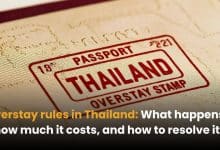Visa extension in Thailand

Visa extension in Thailand is a process that allows foreign nationals to prolong their stay in the country beyond the initial duration granted by their visa. Whether you are a tourist wanting to explore more of Thailand’s beautiful destinations, a business traveller needing extra time for work commitments, or an expatriate planning to reside in the country for an extended period, a visa extension can provide the additional time you require without the inconvenience of leaving and re-entering the country. In this article, we will delve deeper into the various aspects of obtaining a visa extension in Thailand, the earliest date you can request a visa extension in Thailand, and the necessary procedures to follow.
Who is eligible to get a visa extension in Thailand?

For those wishing to extend their stay in Thailand beyond the duration granted by their visa, a Thai Visa Extension is necessary. The type of Thailand Visa held, along with the purpose of the visit, determines the extension one can obtain:
1. Short-term extensions are typically granted for an additional 30 days to those holding a Tourist Visa.
2. Long-term extensions, ranging from 90 days to a year, are provided to Non-Immigrant Visa holders, depending on their specific reasons for residing in Thailand.
When is the earliest date I can apply for a visa extension in Thailand?

As long as you continue to meet the eligibility requirements for a Thai Visa Extension, you can proceed with a renewal application around 30 days before your existing extension’s expiry date. It is advisable to be proactive with your visa renewal process in Thailand. Ideally, you should initiate the renewal 20-30 days before the visa expires to avoid incurring any overstay charges. Do not wait until the last minute! The earliest date to apply for a visa extension in Thailand can vary depending on the type of visa held. Here’s a general overview:
1. Tourist Visa: Holders of a Tourist Visa can apply for a short-term extension (usually 30 days) within the last 30 days of their visa’s validity.
2. Non-Immigrant Visa: Those with a Non-Immigrant Visa can apply for a long-term extension (90 days to one year) within the last 30 days of their current visa’s validity.
3. Visa Exemption: Individuals who entered Thailand under the visa exemption scheme can apply for a short-term extension (usually 30 days) within the last week of their allowed stay.
Where can I get my visa extension done?

To apply for a Thailand Visa Extension, you must visit the Thai Immigration Department office responsible for the region in which you reside within the country. Every province in Thailand has at least one immigration office. You can locate the different branches on the official website of Thailand Immigration. These offices serve as comprehensive centers for handling the visa extension process. However, please note that locations are subject to change.
If you plan to visit the immigration office in Bangkok for a visa extension, you would typically go to Chaeng Wattana. Taxi drivers in the city are familiar with this location and can easily take you there, with taxis being readily available after you complete your visit. As a foreigner seeking a visa extension in Chaeng Wattana, you should go to the Immigration Division 1 of the Immigration Bureau in the Chaeng Wattana Government Complex. This division specifically handles visa and immigration matters related to foreigners, including visa extensions. Once you arrive at the complex, you can ask for directions or follow signs to find the Immigration Division 1 office.
You may also read our guide on Thai E-visa to make your application process smoother.
What documents will I require for a visa extension?

To initiate the process, procure the TM7 form for an Extension of your Temporary Stay in Thailand. Supplement it with the TM8 form if you have a 12-month retirement visa, a 12-month marriage visa, or a visa that authorises you to acquire a Thai work permit.
Ensure to carry your original passport, along with photocopies of the bio page, visa page, the page with the latest entry stamp, and the departure card. Avail of the photocopy services provided at most Thai Immigration Offices for a minimal charge, if necessary.
Affix a recent photo, at least 4×6 cm in size, taken within the preceding six months, to your Thailand visa extension application.
Set aside a fee of 1,900THB for the visa extension, payable for both 30-day and 7-day extensions. Please note that this fee warrants payment solely in the local currency, cash-only.
Certain immigration offices may request the TM30 on an optional basis. This can be completed either online or by visiting the nearest immigration office. TM30 is a reporting requirement in Thailand related to the visa extension process. It is a form that property owners or landlords must submit to notify immigration authorities about the accommodation details of foreign nationals staying at their property. You may click here to download the TM30 form or any form that assists in your visa extension procedure.
Ensure that all photocopies are signed. Typically, a photocopier and a photo service are available on-site or nearby for obtaining these documents at a minimal cost.
Step-by-step visa extension guide in Thailand

The process of extending a Thailand visa is relatively simple and requires only three steps; however, it can take some time. Anticipate spending around 1-2 hours at the immigration office.
1. TM.7 form
Completing the TM7 form is essential for the visa extension in Thailand because it serves as the primary application document for requesting an Extension of Temporary Stay. It provides the necessary information about the applicant and their reasons for extending their stay in the country. Without the TM7 form, the immigration authorities cannot process your request, making it a crucial part of the visa extension process in Thailand. You can download the form here.
2. Complete the form
Fill out the form with accurate and complete personal information, including your name, passport number, nationality, current visa details, and the address of your accommodation in Thailand. Specify the purpose of your extension request and the duration of the desired extension. Do attach a passport-sized photo (4×6 cm) to the form, as per the photo requirements. Sign the form and ensure all information provided is accurate and up-to-date.
3. Hand over necessary documents
Submit your passport and required documents to obtain a queue number.
Proceed to the designated desk when your number is called, and a representative will capture your photo. Subsequently, deliver the 1,900 THB fee in cash. After this step, a short waiting period of approximately 5-10 minutes is anticipated while your passport undergoes processing. Your name will be called out again, signaling the completion of the procedure. Upon receiving the passport, you will notice an additional stamp granting you an extended stay of 30 days.
Regardless of whether you need 3, 13, or the full 30 days, the procedure and fee remain the same.
Abide by the Thai law
Overstaying refers to remaining in Thailand beyond the allowed period specified on your visa. For instance, if you enter Thailand on September 1st with a 60-day tourist visa, your permitted stay will be until October 29th. If you continue staying in Thailand past October 29th without successfully renewing or extending your visa, or leaving and re-entering the country, you will be considered to be overstaying.
It is your responsibility to either leave Thailand or extend your visa while in the country. Failure to do so may result in penalties or legal consequences, including imprisonment and deportation. The penalty for overstaying in Thailand is 500 Baht per day, with a maximum fine of 20,000 Baht (incurred after 40 or more days of overstaying).
Tips for a smooth Thailand visa extension process
Getting a visa extension in Thailand can be straightforward, but a little preparation can significantly improve your experience. Here are some tips to ensure a smooth process:
-
Plan ahead: Don’t wait until the last minute to apply for an extension. Ideally, initiate the process 20-30 days before your visa expires to avoid any complications or overstay fines.
-
Gather documents: Ensure you have all the necessary documents mentioned in your guide. Make clear photocopies of your passport’s bio page, visa page, entry stamp, and departure card. Most immigration offices offer photocopying services for a fee, but having copies prepared beforehand saves time.
- Consider using an agent (optional): For a fee, visa agencies can handle the application process for you. It is saving you time and ensuring everything is completed correctly. This can be particularly helpful if you’re unfamiliar with the process or have complex visa requirements. When discussing the agency, it is undeniable that we, at the Thaiger, are ready to be your assistant.
By following these tips, you can streamline your Thailand visa extension process and ensure a stress-free experience. Remember, a little planning and preparation go a long way!
Latest Thailand News
Follow The Thaiger on Google News:


























